Next Thursday is National Poetry Day in the U.K., but I'll be celebrating in Minneapolis while covering the Heartland Fall Forum, hosted by the Midwest Independent Booksellers Association and the Great Lakes Independent Booksellers Association.
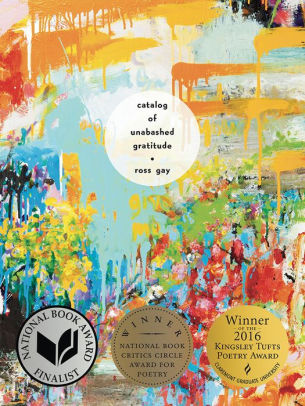 Poetry will be in the Twin Cities air, however. As it happens, one of the featured writers at the Tasting Notes Dinner October 4 is poet Ross Gay, winner of the 2016 National Book Critics Circle Award for Poetry for Catalog of Unabashed Gratitude (U. of Pittsburgh Press). He'll discuss his upcoming collection of short lyric essays, The Book of Delights (Algonquin, February).
Poetry will be in the Twin Cities air, however. As it happens, one of the featured writers at the Tasting Notes Dinner October 4 is poet Ross Gay, winner of the 2016 National Book Critics Circle Award for Poetry for Catalog of Unabashed Gratitude (U. of Pittsburgh Press). He'll discuss his upcoming collection of short lyric essays, The Book of Delights (Algonquin, February).
Minneapolis is a great poetry town. I discovered this inadvertently at 19, when I was introduced to John Berryman's newly published His Toy, His Dream, His Rest in a college English class, though I wouldn't actually set foot in the city for the first time until 2008.
I always wanted to be old. I wanted to say
'O I haven't read that
for fifteen years'
or 'my copy of that
seems in the usual course to have gone astray'
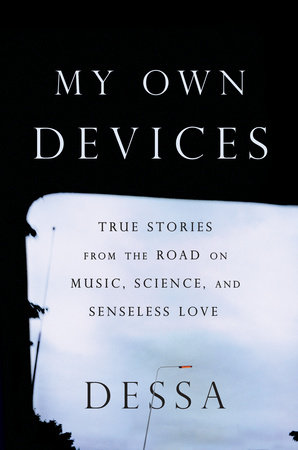 I still read Berryman, and I'm fortunate that the Minneapolis/poetry connection has been a renewable resource. Lately I've been listening to Chime, a new album from Dessa, the rapper, singer/songwriter, essayist and--by any reckoning and reading of her lyrics--poet, with solid Minneapolis credentials. I'm also reading her new book, My Own Devices: True Stories from the Road on Music, Science, and Senseless Love (Dutton).
I still read Berryman, and I'm fortunate that the Minneapolis/poetry connection has been a renewable resource. Lately I've been listening to Chime, a new album from Dessa, the rapper, singer/songwriter, essayist and--by any reckoning and reading of her lyrics--poet, with solid Minneapolis credentials. I'm also reading her new book, My Own Devices: True Stories from the Road on Music, Science, and Senseless Love (Dutton).
In fact, Dessa prompted my recollection Berryman's "old" lines after I encountered this passage: "I have always been preoccupied with death--mine and other people's--since I was a kid. I consider myself the steward of the old woman I will become, and I'm aware that with every day, we are closer to the same person. My parents used to joke that I was eight going on forty."
I get that.
I also realized that many of the poetry-related books I've read in recent months have a Minneapolis connection. Graywolf Press published the extraordinary Don't Call Us Dead by Danez Smith, who lives in the city and recently became the youngest winner ever of the U.K.'s Forward Prize for the Best Poetry Collection. Bidisha, one of the judges, said "Smith's finely crafted poetry makes us look anew at the intertwined natures of politics and sexuality and stands as a powerful warning: this is what's happening, be alert, pay attention." Like this:
do you know what it's like to live
on land who loves you back
no need for geography
now, we safe everywhere.
point to whatever you please
& call it church, home, or sweet love.
paradise is a world where everything
is sanctuary & nothing is a gun.
Milkweed Editions published two of my favorite books this year, including Ada Limón's The Carrying: Poems. From "Bust":
I'm driving alone in the predawn
dark to the airport, nerves nearly gone
when I fly now, gravity only another holy
thing to contend with, what pushes us
down squeezing out the body's air.
In an NPR Weekend Edition interview, Limón observed that "the questions just keep getting larger and larger. How do we hold all of these dualities in our minds--the daily bombardment of painful news and then the sort of sweet, little moments at home and the smallness of life? And how do we celebrate the shift in seasons or the moment you hold hands amongst all of that great tragedy? I'll ask it to myself over and over--how do we live like this? How do we find this balance?"
In her poetry, she does.
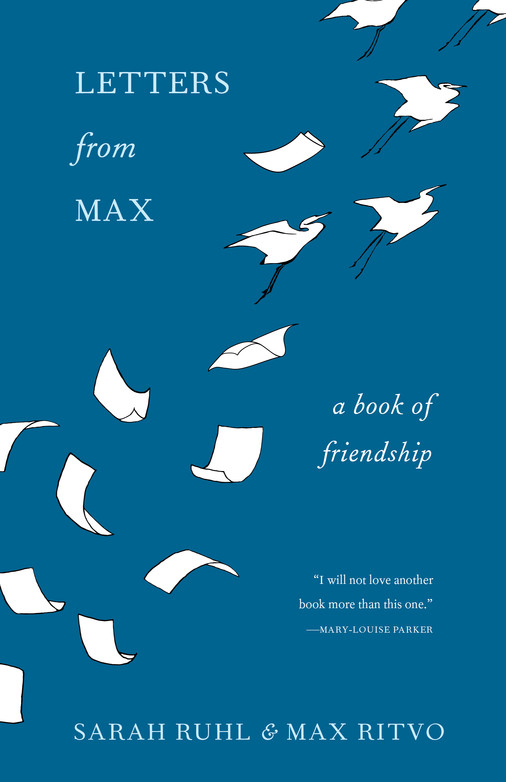 Also from Milkweed is Letters from Max: A Book of Friendship. It is at once painful and enlightening to eavesdrop on the correspondence between playwright Sarah Ruhl and the late poet Max Ritvo (Four Reincarnations: Poems, Milkweed). This is more than a collection of letters, poems, songs and e-mails between a teacher and her former student who becomes a friend. Ritvo's cancer death sentence is the shadow here, yet what emerges from their brilliant, funny, heartbreaking conversations is a frank exploration of human connection, mortality, art and much more in precious real time.
Also from Milkweed is Letters from Max: A Book of Friendship. It is at once painful and enlightening to eavesdrop on the correspondence between playwright Sarah Ruhl and the late poet Max Ritvo (Four Reincarnations: Poems, Milkweed). This is more than a collection of letters, poems, songs and e-mails between a teacher and her former student who becomes a friend. Ritvo's cancer death sentence is the shadow here, yet what emerges from their brilliant, funny, heartbreaking conversations is a frank exploration of human connection, mortality, art and much more in precious real time.
Describing his radiation treatment, Ritvo observes: "But the most heartbreakingly beautiful just-for-you thing is the sound the machine makes when the beam is emitted. Sarah, it sounds exactly like a tiny man with a tremor is opening a can of soup inside the gun.... Soup is the food that most allows your mouth to approximate silence--chewing is so very similar to speech."
Ruhl responds: "For me I think there is something about the distillation process of making soup, and knowing that you are eating something distilled by time and patient human beings." Theirs is a life and death conversation, deftly seasoned with poetry.
And then there is Raymond McDaniel's The Cataracts (Coffee House Press), which has many poems I love, especially "Pilgrims." It opens:
The poem about impermanence,
written by the itinerant poet,
comes to me translated,
as a quote in a book
in which the poet himself is itinerant,
though he resides permanently
in many equivalent quotes
in many equivalent books
As I celebrate National Poetry Day U.K. next week in Minneapolis, I'll have all these extraordinary words--and a city full of book people--for company. What more could a reader ask for?
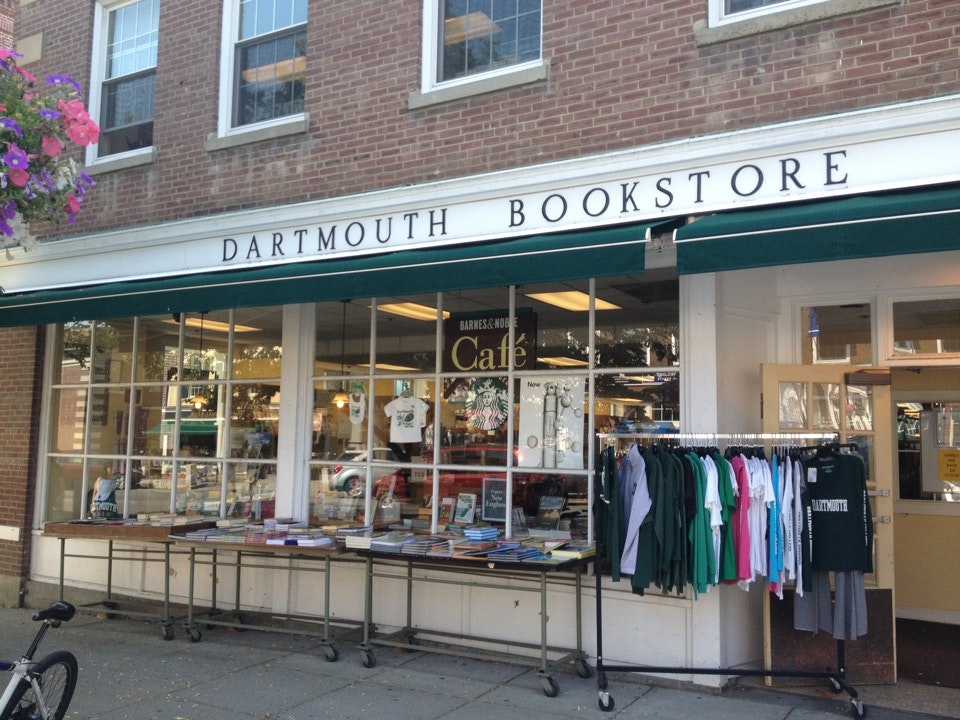 The Dartmouth Bookstore, Hanover, N.H., is closing at the end of the year after Barnes & Noble College, which manages the store, was unable to renew its lease, the Dartmouth reported. This would leave the town "without a place to buy newly released books," the paper added.
The Dartmouth Bookstore, Hanover, N.H., is closing at the end of the year after Barnes & Noble College, which manages the store, was unable to renew its lease, the Dartmouth reported. This would leave the town "without a place to buy newly released books," the paper added.








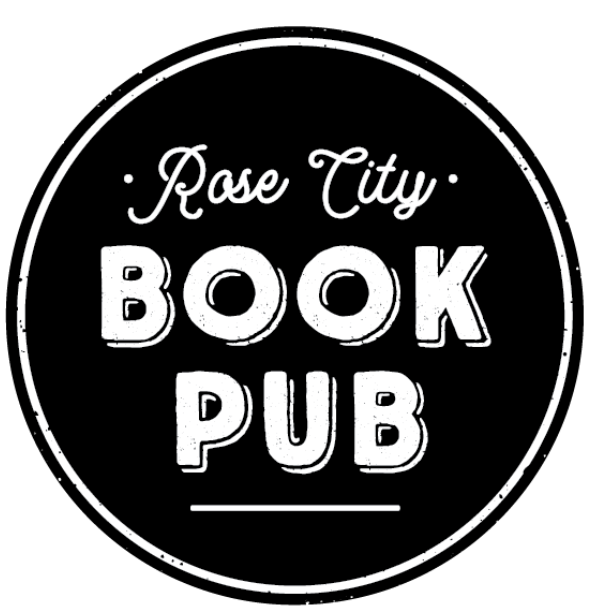 Rose City Book Pub
Rose City Book Pub
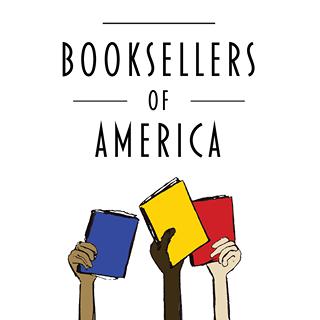 The
The 
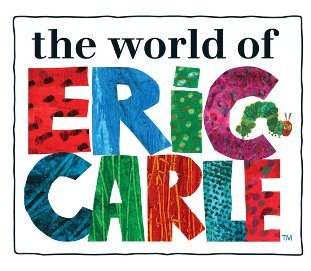 Penguin Young Readers has launched the World of Eric Carle imprint, which is dedicated to the works of the acclaimed author and illustrator. Under the editorial leadership of Francesco Sedita, publisher of
Penguin Young Readers has launched the World of Eric Carle imprint, which is dedicated to the works of the acclaimed author and illustrator. Under the editorial leadership of Francesco Sedita, publisher of 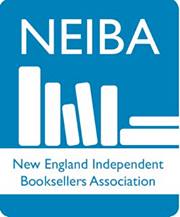 At the 45th annual
At the 45th annual 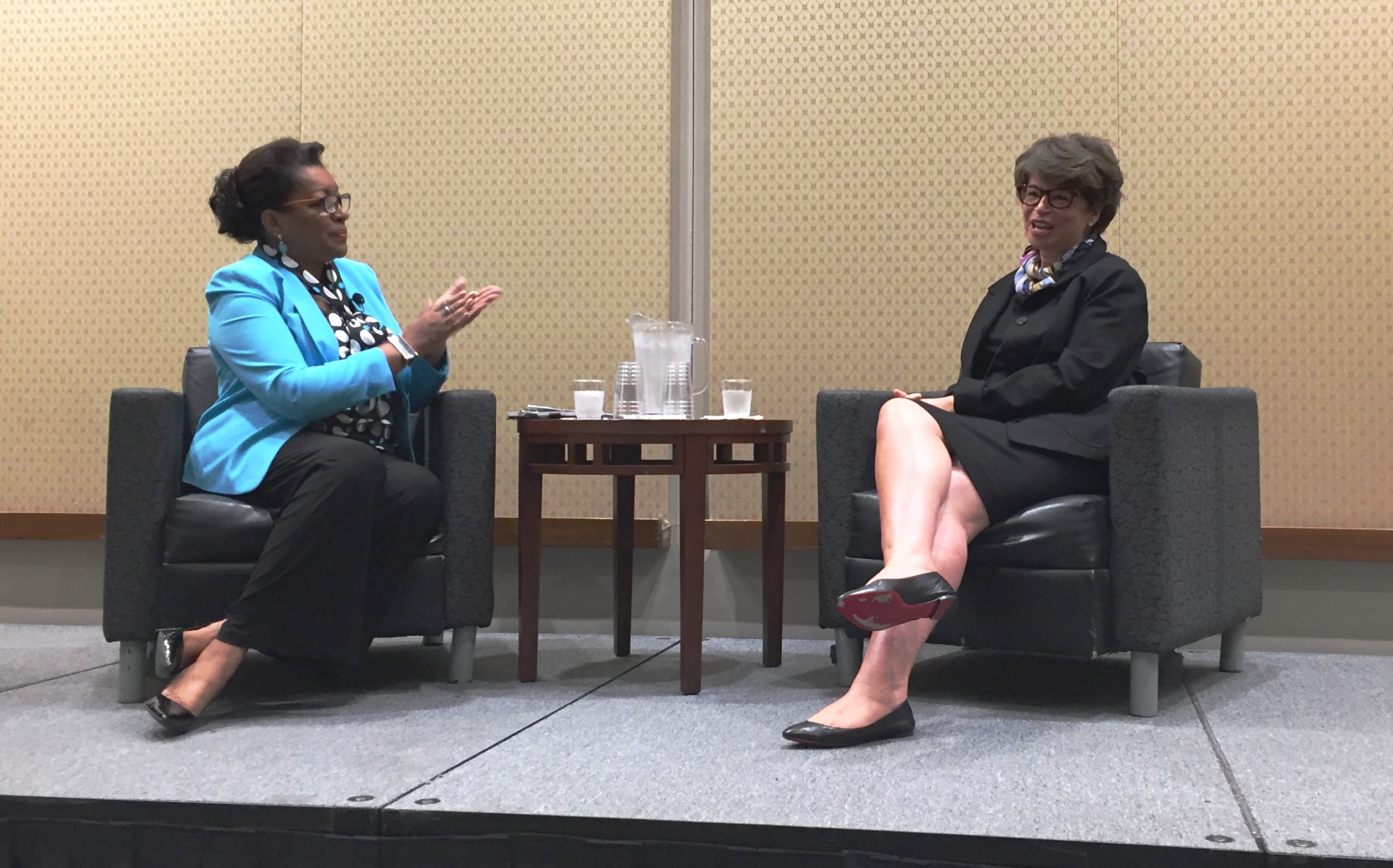 "I grew up in a family of readers," Valerie Jarrett (r.), former senior adviser to President Barack Obama, said to journalist Karen Holmes Norton (l.) in her opening keynote. Her "unusual" childhood, she suggested--living in Iran on a medical compound until the age of five, then raised in Chicago in the '60s--helped develop her interest in public service. This interest led, first, to positions in Chicago's city government, then to becoming Michelle and Barack Obama's trusted personal advisor and, eventually, to the White House. Her new book, Finding My Voice (Viking), is about this journey.
"I grew up in a family of readers," Valerie Jarrett (r.), former senior adviser to President Barack Obama, said to journalist Karen Holmes Norton (l.) in her opening keynote. Her "unusual" childhood, she suggested--living in Iran on a medical compound until the age of five, then raised in Chicago in the '60s--helped develop her interest in public service. This interest led, first, to positions in Chicago's city government, then to becoming Michelle and Barack Obama's trusted personal advisor and, eventually, to the White House. Her new book, Finding My Voice (Viking), is about this journey.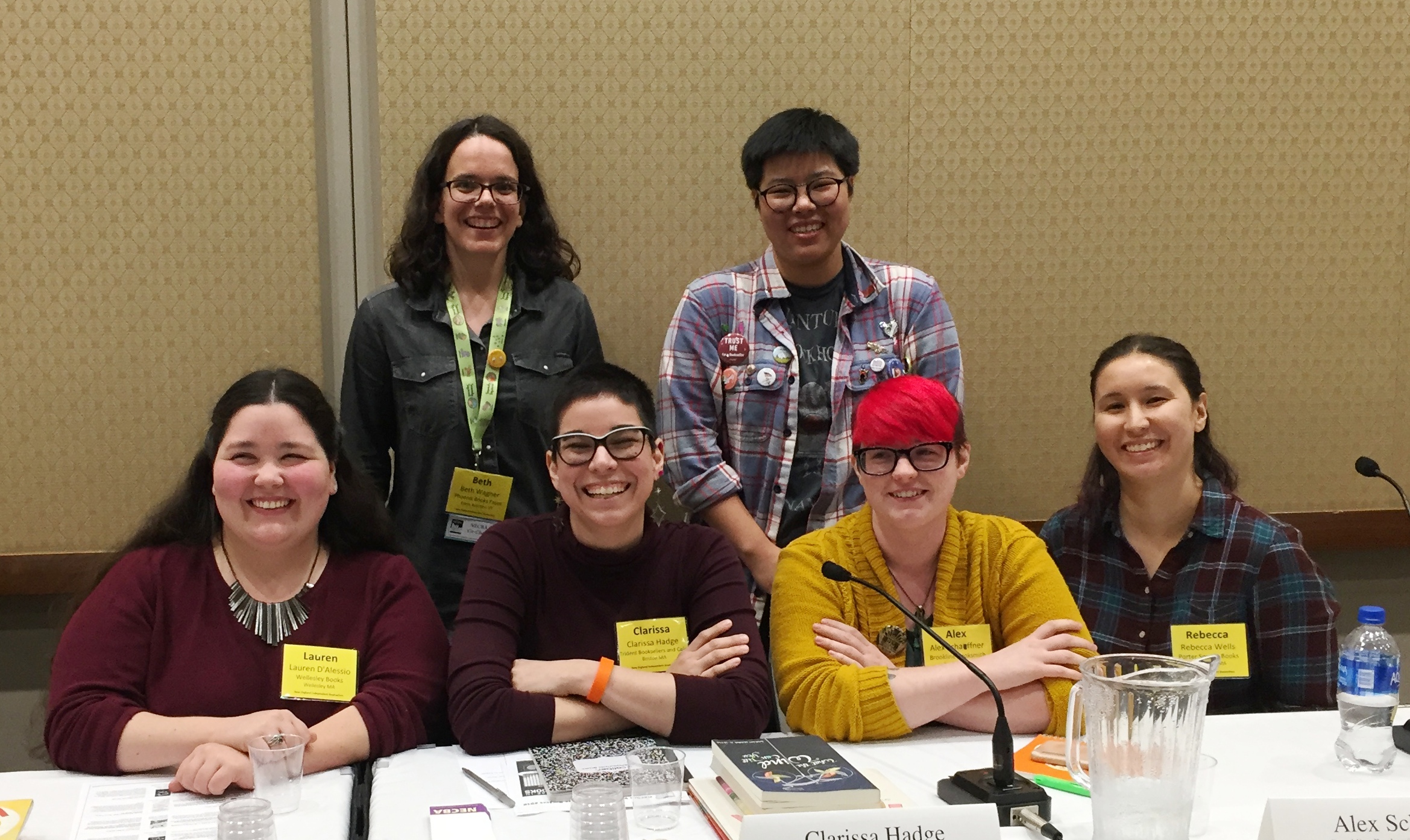 The NECBA Windows and Mirrors Project "seeks to draw on the expertise of the New England bookselling community in curating a yearly list of diverse titles that demonstrate strong representations of marginalized identities as well as great literary merit." The 2018 list was unveiled at the NEIBA fall conference during the
The NECBA Windows and Mirrors Project "seeks to draw on the expertise of the New England bookselling community in curating a yearly list of diverse titles that demonstrate strong representations of marginalized identities as well as great literary merit." The 2018 list was unveiled at the NEIBA fall conference during the 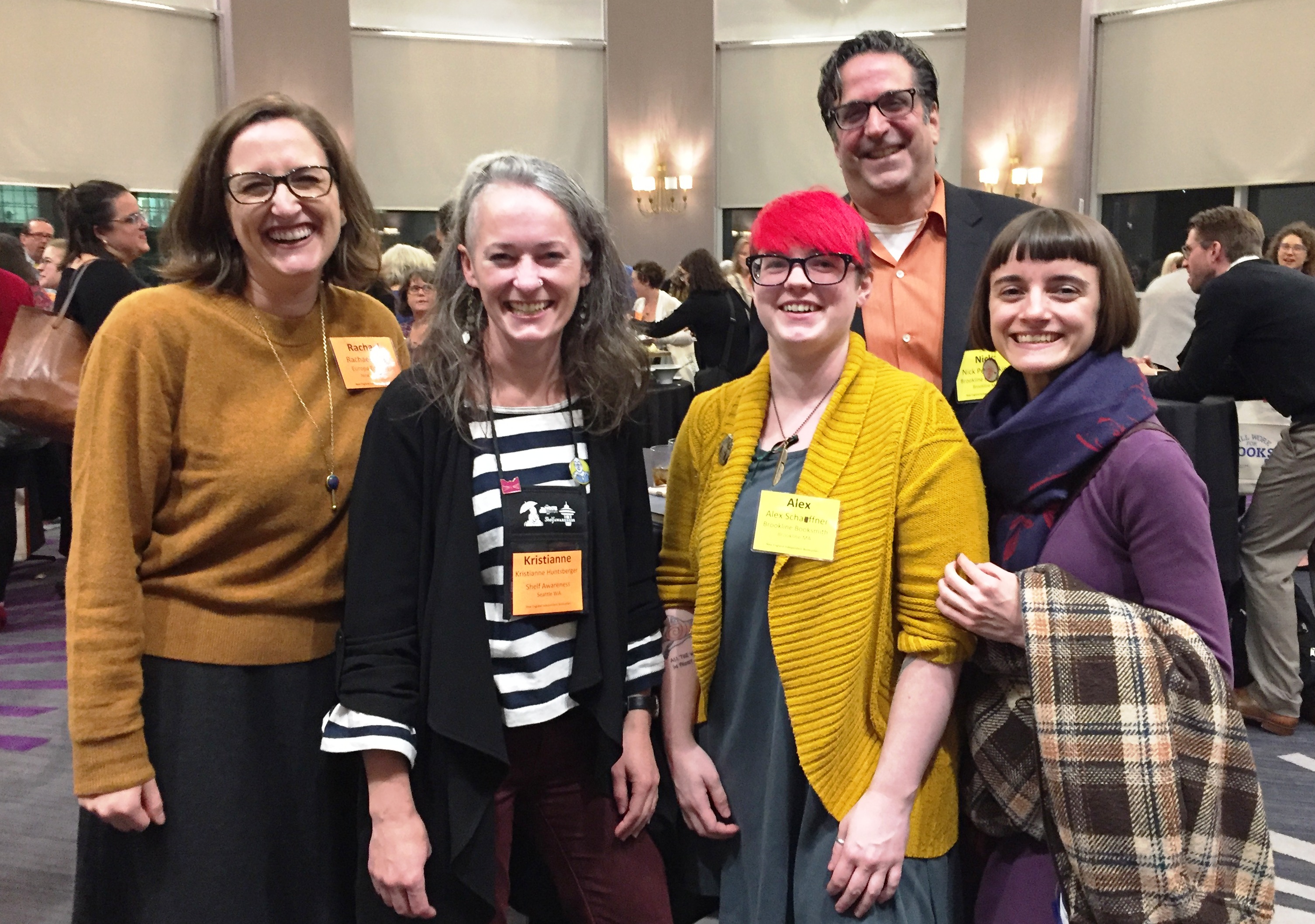 Booksellers, publishing representatives and other industry colleagues drank, dined and discussed books at the Author Reception on Tuesday night: (l.-r.) Rachael Small (Europa Editions), Kristianne Huntsberger (Shelf Awareness), and Alex Schaffner, Nick Petrulakis and Lydia McOscar, all of Brookline Booksmith, Brookline, Mass.
Booksellers, publishing representatives and other industry colleagues drank, dined and discussed books at the Author Reception on Tuesday night: (l.-r.) Rachael Small (Europa Editions), Kristianne Huntsberger (Shelf Awareness), and Alex Schaffner, Nick Petrulakis and Lydia McOscar, all of Brookline Booksmith, Brookline, Mass.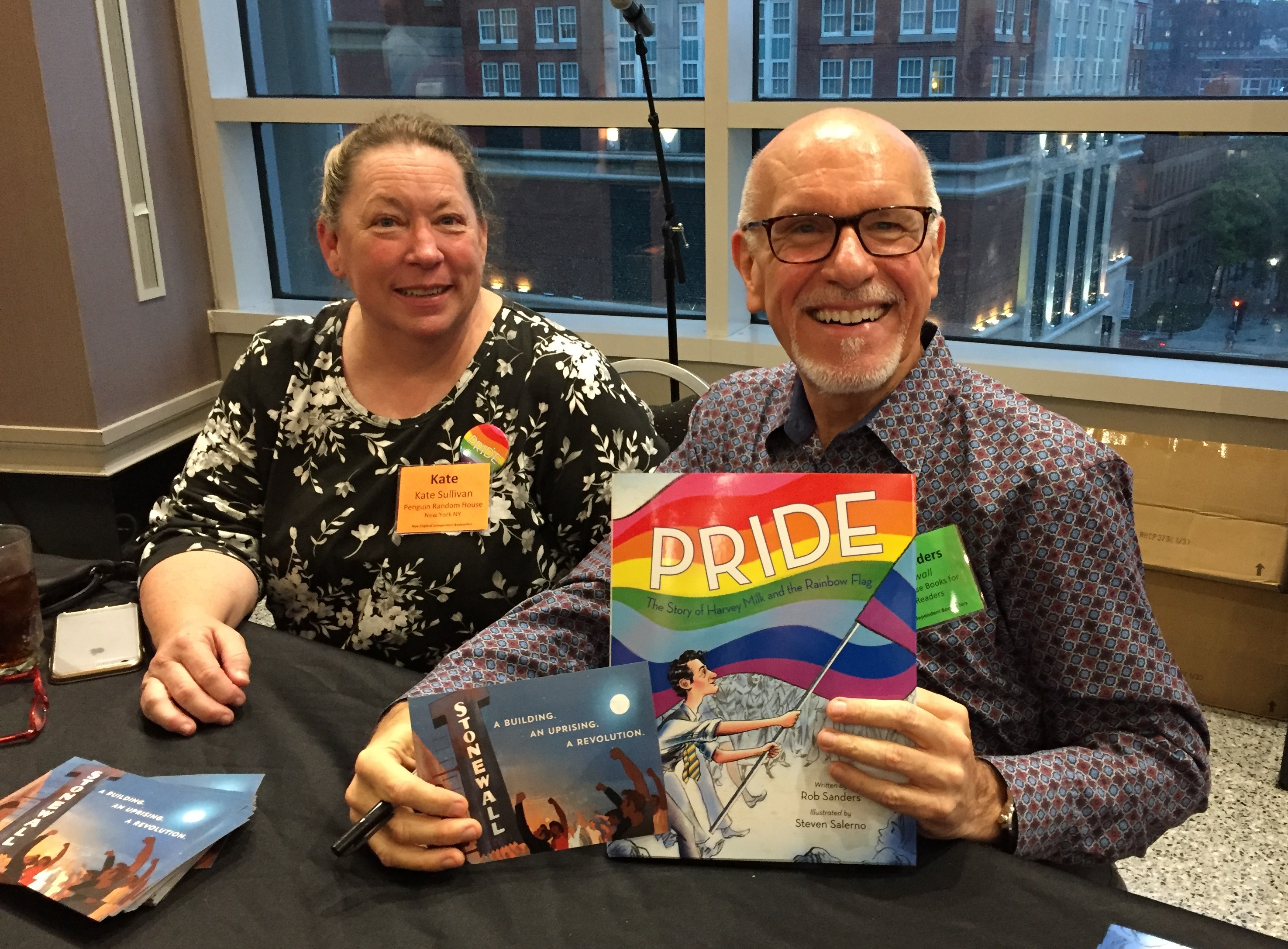 Rob Sanders presents his newest title, Pride (Random House Books for Young Readers), at the Author Reception, with PRH's Kate Sullivan.
Rob Sanders presents his newest title, Pride (Random House Books for Young Readers), at the Author Reception, with PRH's Kate Sullivan.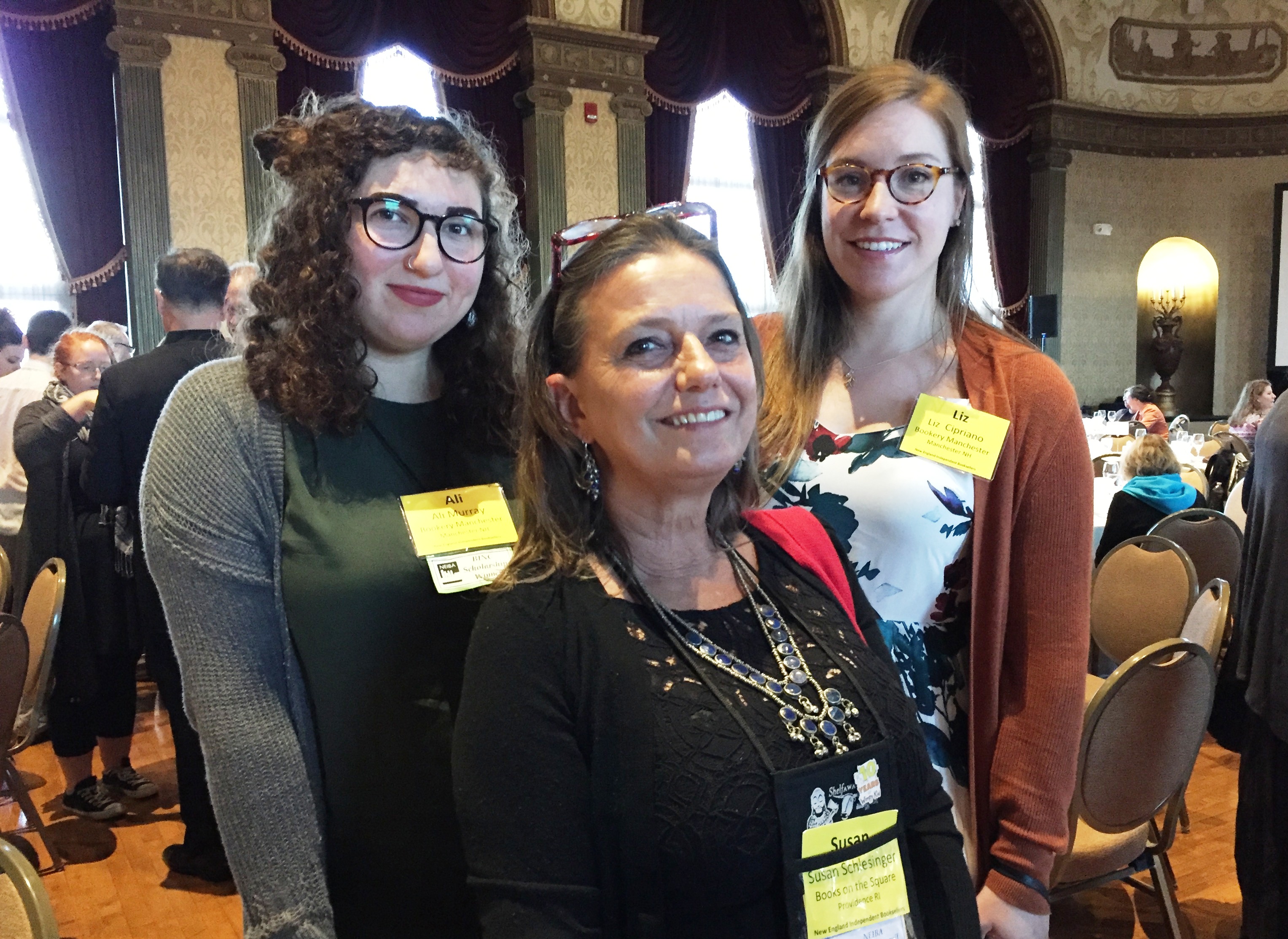 At Wednesday evening's awards banquet, Chris Rose of Andover Bookstore/HugoBooks (Andover, Mass.) told booksellers to be "wildly proud of what you do every day." Pictured here are BINC scholarship winner Ali Murray (Bookery Manchester, Manchester, N.H.), NEIBA advisory council member Susan Schlesinger (Books on the Square, Providence, R.I.) and Liz Cipriano (Bookery Manchester) enjoying the banquet and being wildly proud of what they do.
At Wednesday evening's awards banquet, Chris Rose of Andover Bookstore/HugoBooks (Andover, Mass.) told booksellers to be "wildly proud of what you do every day." Pictured here are BINC scholarship winner Ali Murray (Bookery Manchester, Manchester, N.H.), NEIBA advisory council member Susan Schlesinger (Books on the Square, Providence, R.I.) and Liz Cipriano (Bookery Manchester) enjoying the banquet and being wildly proud of what they do.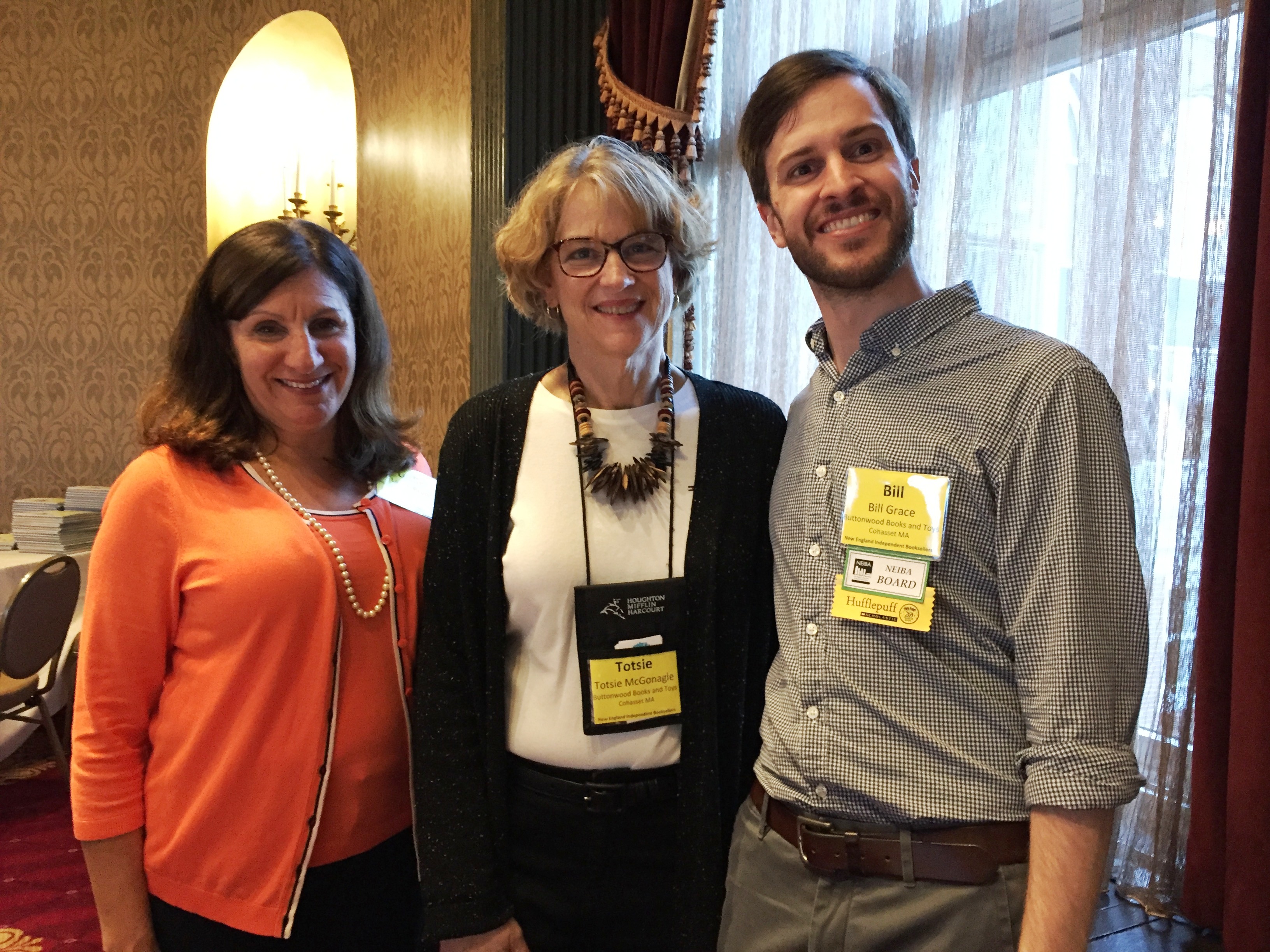 Presidential Award winner Elizabeth McCracken told the Wednesday evening award banquet audience that "America is an anthology--it is multi-voluminous and, in fact, it is a bookstore." Leslie Pryor, Totsi McGonagle and NEIBA board member Bill Grace (Buttonwood Books and Toys, Cohasset, Mass.) celebrating together the expansive world of bookselling.
Presidential Award winner Elizabeth McCracken told the Wednesday evening award banquet audience that "America is an anthology--it is multi-voluminous and, in fact, it is a bookstore." Leslie Pryor, Totsi McGonagle and NEIBA board member Bill Grace (Buttonwood Books and Toys, Cohasset, Mass.) celebrating together the expansive world of bookselling.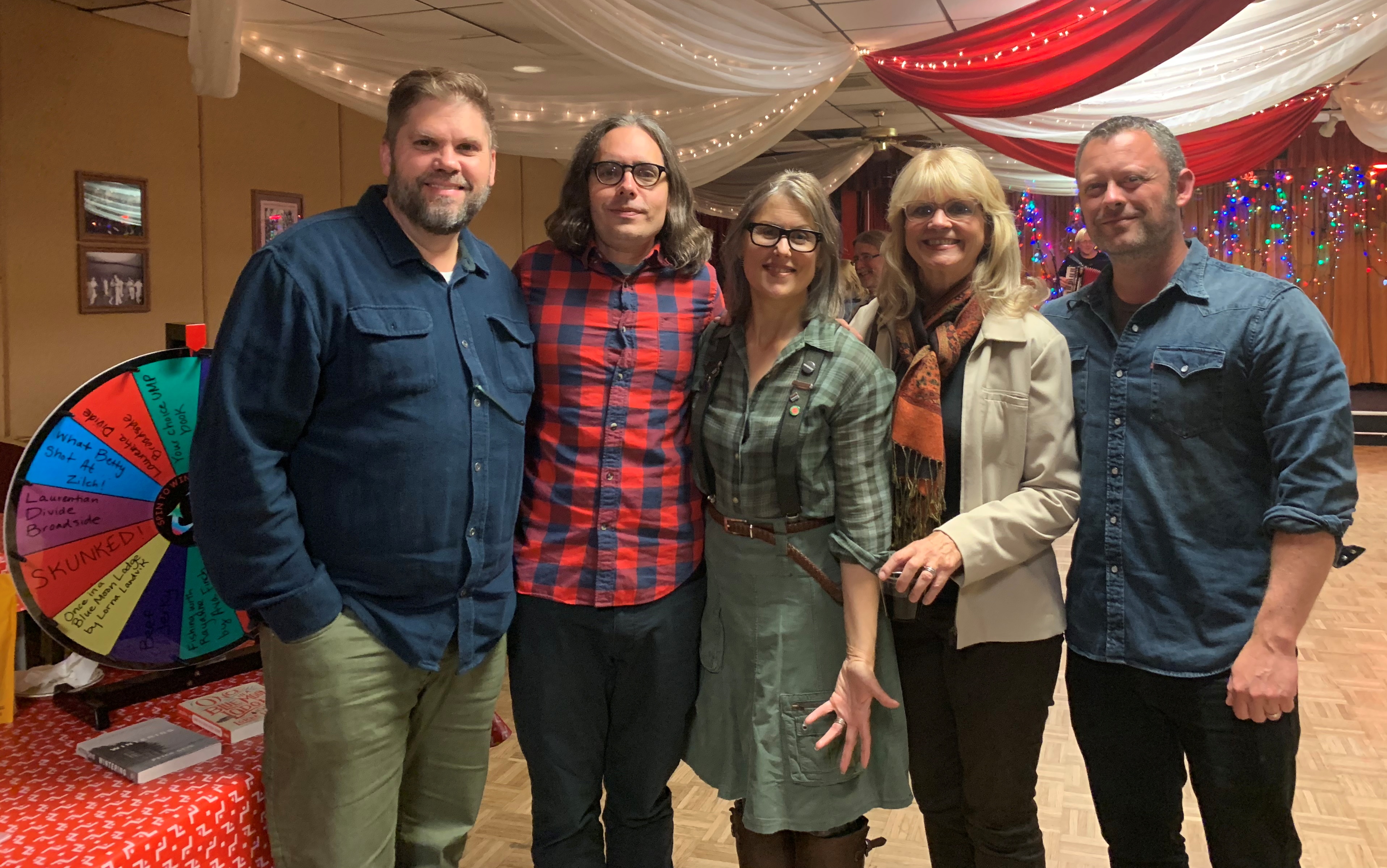 Author Sarah Stonich (center) celebrated the launch of her new novel, Laurentian Divide (University of Minnesota Press), with a north woods-inspired party at the Eagles Club #34 in South Minneapolis. The event featured a meat raffle, a prize wheel, pierogies, an accordion player and readings by fellow Minnesota authors (l.-r.) Peter Geye; Stonich's editor Erik Anderson; Lorna Landvik; and Benjamin Percy.
Author Sarah Stonich (center) celebrated the launch of her new novel, Laurentian Divide (University of Minnesota Press), with a north woods-inspired party at the Eagles Club #34 in South Minneapolis. The event featured a meat raffle, a prize wheel, pierogies, an accordion player and readings by fellow Minnesota authors (l.-r.) Peter Geye; Stonich's editor Erik Anderson; Lorna Landvik; and Benjamin Percy.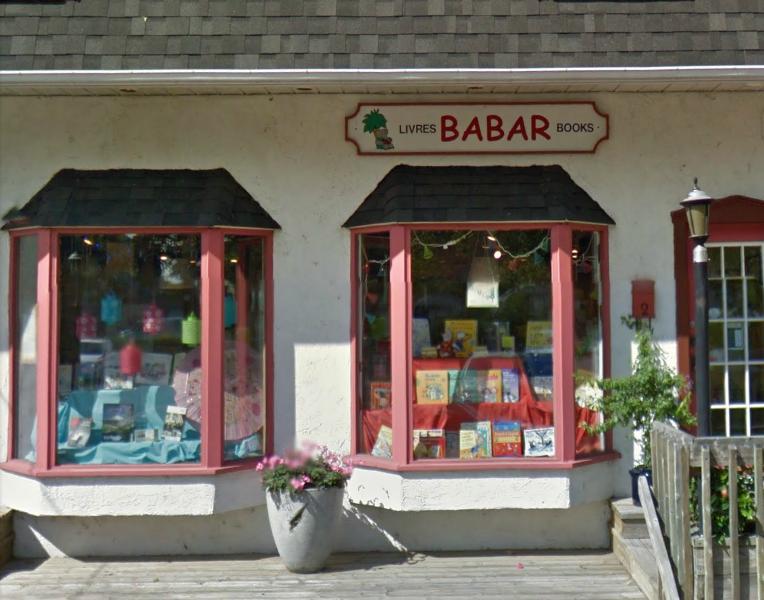 Megan Byers of
Megan Byers of 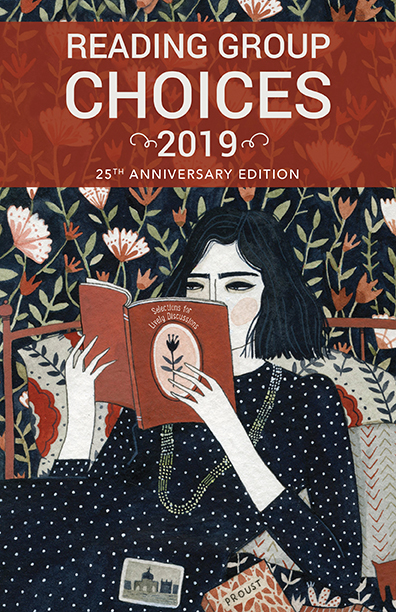 Reading Group Choices 2019: Selections for Lively Book Discussions, the 25th annual edition of the guide to book club picks, is now available from
Reading Group Choices 2019: Selections for Lively Book Discussions, the 25th annual edition of the guide to book club picks, is now available from  Building a Sustainable Home: Practical Green Design Choices for Your Health, Wealth, and Soul
Building a Sustainable Home: Practical Green Design Choices for Your Health, Wealth, and Soul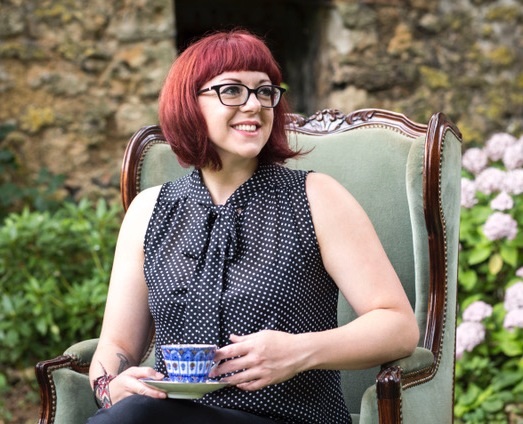
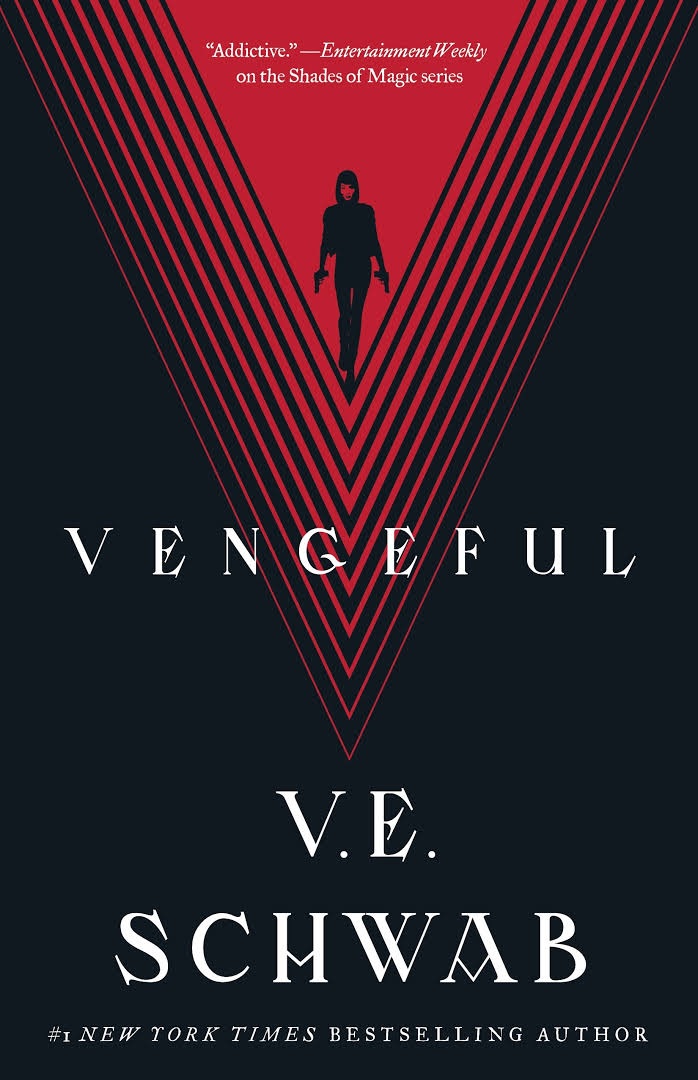 Book you're an evangelist for:
Book you're an evangelist for: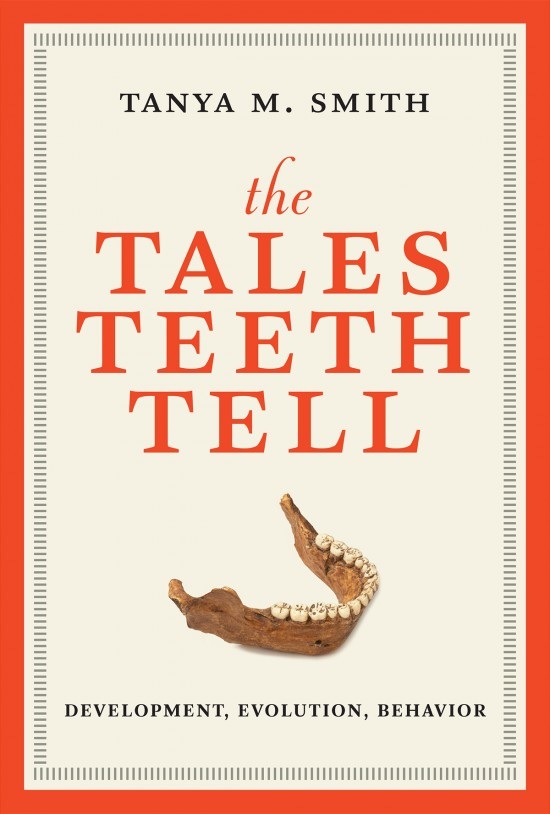 As the first in her family to attend college, Tanya Smith went to SUNY Geneseo to study biology in hopes of following the paths of Jane Goodall and Dian Fossey, observing African mountain gorillas in the wild. Instead, she became fascinated by microscopy and the human history it revealed when fossilized teeth were imaged. The Tales Teeth Tell is a first-person account of her work as an associate professor at Harvard and at the Australian Research Centre for Human Evolution at Griffin University in Brisbane. She offers a fascinating history of dental paleoanthropology and the role of teeth in human evolution. As she notes: "Not to knock rings in trees... but there is far more to discover inside our own mouths."
As the first in her family to attend college, Tanya Smith went to SUNY Geneseo to study biology in hopes of following the paths of Jane Goodall and Dian Fossey, observing African mountain gorillas in the wild. Instead, she became fascinated by microscopy and the human history it revealed when fossilized teeth were imaged. The Tales Teeth Tell is a first-person account of her work as an associate professor at Harvard and at the Australian Research Centre for Human Evolution at Griffin University in Brisbane. She offers a fascinating history of dental paleoanthropology and the role of teeth in human evolution. As she notes: "Not to knock rings in trees... but there is far more to discover inside our own mouths."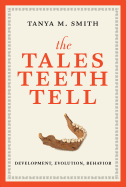
 Poetry will be in the Twin Cities air, however. As it happens, one of the featured writers at the Tasting Notes Dinner October 4 is poet Ross Gay, winner of the 2016 National Book Critics Circle Award for Poetry for Catalog of Unabashed Gratitude (U. of Pittsburgh Press). He'll discuss his upcoming collection of short lyric essays, The Book of Delights (Algonquin, February).
Poetry will be in the Twin Cities air, however. As it happens, one of the featured writers at the Tasting Notes Dinner October 4 is poet Ross Gay, winner of the 2016 National Book Critics Circle Award for Poetry for Catalog of Unabashed Gratitude (U. of Pittsburgh Press). He'll discuss his upcoming collection of short lyric essays, The Book of Delights (Algonquin, February).  I still read Berryman, and I'm fortunate that the Minneapolis/poetry connection has been a renewable resource. Lately I've been listening to
I still read Berryman, and I'm fortunate that the Minneapolis/poetry connection has been a renewable resource. Lately I've been listening to  Also from Milkweed is Letters from Max: A Book of Friendship. It is at once painful and enlightening to eavesdrop on the correspondence between playwright Sarah Ruhl and the late poet Max Ritvo (
Also from Milkweed is Letters from Max: A Book of Friendship. It is at once painful and enlightening to eavesdrop on the correspondence between playwright Sarah Ruhl and the late poet Max Ritvo (